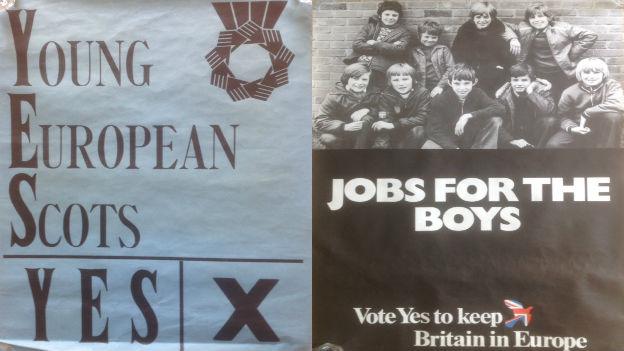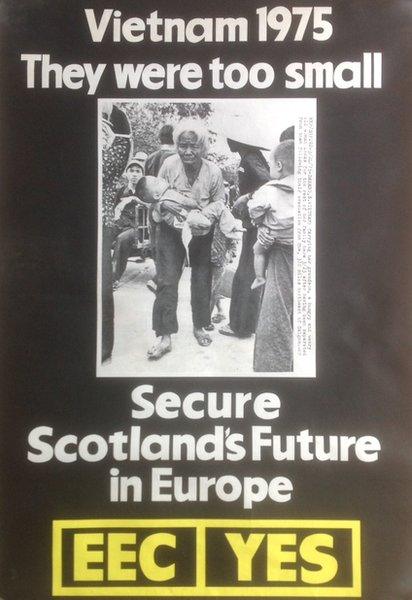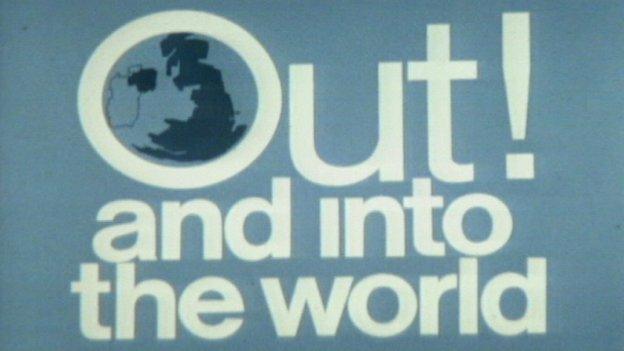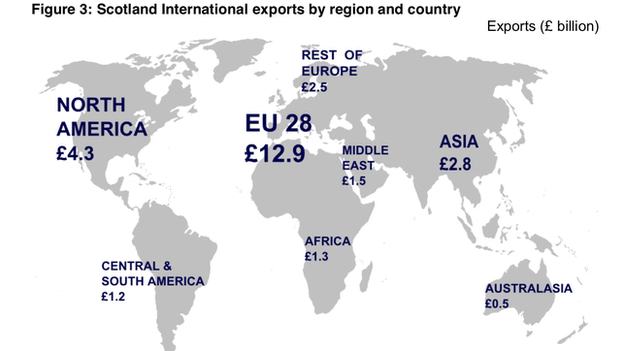From Indyref to Euroref: What's been learned?
- Published

A rifle through the attic recently turned up a memory of being 11 years old, newly taken by politics, and collecting stuff - the way boys do.
A tube of posters included campaign material from the 1975 referendum on British membership of what was then the European Economic Community.
As political messaging, some of it looks dated now. And just a bit sexist.

And most extraordinary of all, it seems to indicate that if Britain wasn't inside the European club, it would be too small to face the mighty clashing forces of the Cold War that had forced Vietnamese refugees to take to perilous seas in rickety boats.
Next week will be 40 years on from the referendum, on 5 June 1975. And it's a sad reflection that we are now witness to not just a 21st century seaborne refugee crisis in Asia, but another that comes much closer to home, in the Mediterranean.
Veterans of last year's referendum on Scottish independence will also appreciate, possibly through gritted teeth, the 1975 propaganda about Britain being too small to go it alone.
In case you're wondering, I don't have any souvenirs of the 'no' campaign. Not being an employee of the BBC, there was less pressure to be even-handed. A more likely explanation: 'No to Europe' were less well funded and less generous with the freebies for Edinburgh urchins.
Either way, here's one from the BBC website, including Big Ben bongs, a bit of Churchill, and Elgar's stirring Nimrod:

In or out?
So now, we know there will be another referendum on Britain's place in Europe. And I'm struck that the 'out' side of the argument has already given away a huge advantage to their opponents.
The question: "Should the United Kingdom remain a member of the European Union?" is a 'yes' and 'no' choice.
Anyone who watched the Scottish independence campaign last year will have seen the advantage of being able to argue, positively, for a 'yes'.
That referendum question was tested and approved by the Electoral Commission. If they were asked again, experience might have taught them that it would be a fairer fight if voters were asked to choose between being 'in' or 'out' of the EU.
Export markets
In Scotland, it seems likely this will be a strangely lop-sided campaign. Both the SNP's current dominance of party politics, and the lack of traction for euro-scepticism, even within the Scottish Conservatives, suggests this won't be much of a battle for the politicians.
Business, therefore, may take a higher profile. Why? Firstly, because businesses which trade with the rest of the EU have a stake in keeping trade routes open, and the British having some influence in setting the Brussels rules.
Among export markets, the European Union is particularly important, with nearly half of the value:

source: Scottish government Global Connections Survey 2015
As with the Scottish independence referendum, smaller businesses which export less or not at all, have less concern about keeping those markets open. They may take a stand against Europe, but for more political than commercial reasons.
That more political approach is what I found when I recently interviewed Alastair MacMillan of White House Products for a film broadcast on Scotland 2015.
He is on the advisory committee of the Business for Britain campaign group. A third of his sales of specialised hydraulic components are to EU countries, but he sees no problem for those sales from a British pull-out.
When pressed, there weren't many impacts directly on his business from EU red tape, though he cited the expense for his suppliers of haulage driver rules.
Summer soundings
While the chairman of JCB construction equipment is for a 'no' vote, the big business guns calling for the country to stay in Europe have recently included Vodafone and Deutsche Bank.
Business groups in Scotland are only now responding to the post-election fact that we face another referendum by the end of 2017, and perhaps much sooner. They'll be taking soundings over the summer.
The Federation of Small Businesses is committed to not taking a stance on 'yes' or 'no', as it did last year, but will instead focus on informing its members about the implications of the vote.
The Scottish Chambers of Commerce took some soundings already, and are taking a fairly pro-Europe line. Amid the surveys on independence carried out last year, they also asked members what they thought an exit from the EU would mean for their businesses. Of those responding, 61% said it would be negative, and 13% positive.
Boycott risk
The Confederation of British Industry (CBI) is taking a strongly pro-European business line, with chairman Sir Mike Rake urging members to get engaged in the debate early.
His membership has responded to surveys to say that 80% are for staying in a reformed EU, 67% say exit would damage access to markets, and 75% say inward investment would fall.
The challenge to engage early raises the question of what's been learned from the Scottish independence referendum.
Lots of business stayed out of that debate, either because they thought it was going to be a 'no' vote, and therefore not much change, or because they didn't want the hassle of either political pushback or the possibility of customer boycotts.
Many of them relied on their trade associations to do the talking, and take the flak, for them.
That's how the CBI became horribly embroiled in the campaign, by registering as a participant on the pro-union side, hitting a huge political storm with public sector members pressured to cease their membership, and then de-registering, saying it had been a mistake by a junior official. They won't want to do that again.
The tactics used against it, by the pro-independence Business for Scotland group, were to question its membership, how well it had consulted members and who it spoke for. Exactly the same tactics are being used against the CBI by Business for Britain.
Reform, or what?
There's another lesson that was learned from the independence campaign by, among others, Scottish Financial Enterprise.
The finance sector representative grouping is for staying in the EU. And in facing the coming campaign, Owen Kelly, its chief executive, told me that there are similarities between the Scottish independence and the out-of-Europe prospectuses.
In both cases, he said, we could not expect to know what would happen if the union were to be broken up, until after there's a majority vote to break. There were no rules on negotiating Scottish independence, and all we know about a break from the EU is that it would take two years.
That said, most business groupings that want to see the UK remain in the EU also want to see the European Union reformed. They broadly support David Cameron as he tours European capitals trying to press for a deal.
But we don't know what businesses will say if he returns from these talks with little reform achieved. And of course, we don't know what the Prime Minister will say either.